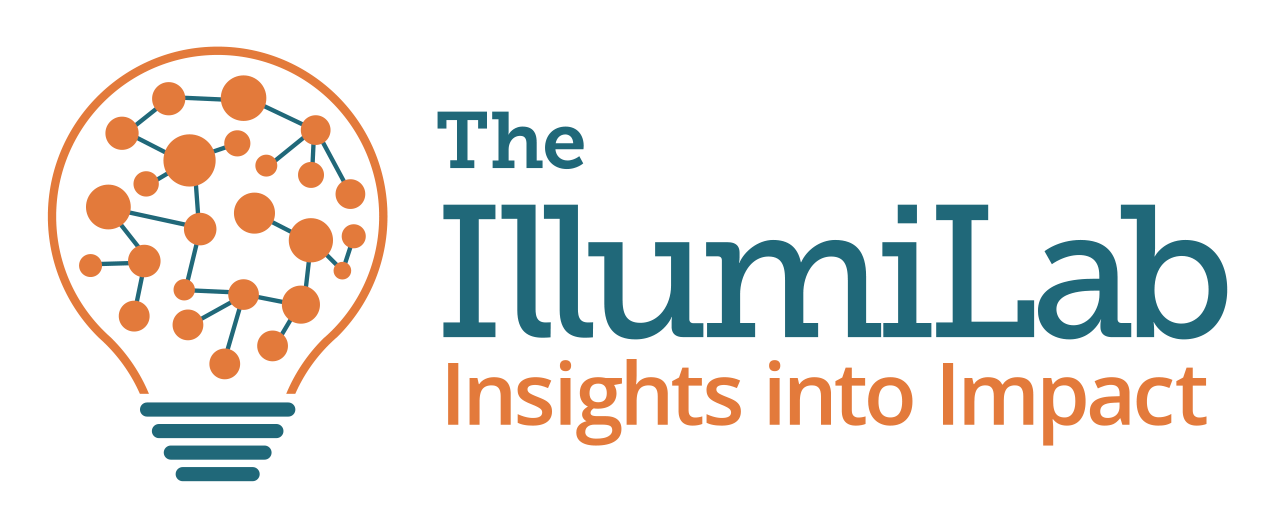Tools are Just Tools
In our first years, The IllumiLab’s work was focused almost exclusively on building tools nonprofits could use to measure their performance (logic models, measures, data collection tools, performance management plans, etc.). This was the pain point organizations experienced, and this was the service they requested. But we soon realized that without a collection of complementary capabilities and capacities, necessary support, and the right environment, organizations rarely used the tools to their greatest potential.
Our work has since expanded. We now support organizations in building complementary, interdependent toolkits. And we aim to work in ways that increase capacities and develop mindsets. To reflect this expansion, we felt the need to clearly articulate, commit to, and plan towards our intentions. So, this year we’ve been researching and reflecting to develop our Vision, Mission, and Theory of Change.
As we examined what inspires us, we identified four core capacities that we believe we are uniquely equipped and motivated to help nonprofits build. In 2023, we will be asking questions to foster reflection on the strength of these capacities in your organizations and bringing you research, tips, and tools for building them. Stay tuned . . .
Plan Thoughtfully
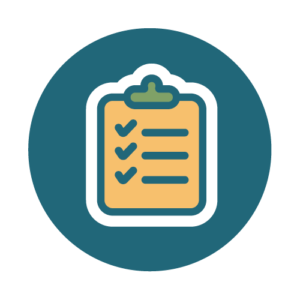 Planning should not be a luxury, but nonprofits often seem to feel and act like it is. Living under the tyranny of the urgent and with financial support to do things, not to plan things, organizations are often biased toward busy-ness and action, sacrificing planning.
Planning should not be a luxury, but nonprofits often seem to feel and act like it is. Living under the tyranny of the urgent and with financial support to do things, not to plan things, organizations are often biased toward busy-ness and action, sacrificing planning.
Your plans should serve you. You shouldn’t serve them. Don’t settle for stale templates and tired processes. We believe that thoughtful planning processes produce plans that are designed with intended uses and users in mind. As a result, they deliver so much value in the form of clarity, cohesion, focus, and results that we think nonprofit leaders will consider them essential up-front investments in any undertaking.
We use tools and facilitate processes for planning that start with the end in mind, are collaborative, and acknowledge the interdependence of your teams, departments, and various projects. The resulting plans – whether they’re strategic, operational, or project plans – are comprehensive, well-supported, and actionable. Meaningful, measurable, manageable. That’s our mantra.
Design Intentionally
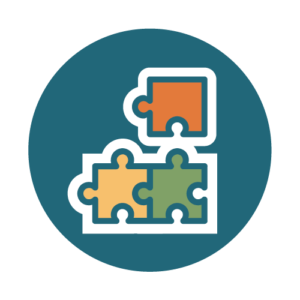 In our work, when people think of designing, they usually only think of designing programs, but there is so much more of nonprofits’ work that can benefit from intentional design – management tools (meeting agendas, reports, dashboards, etc.), databases, organizational structures, workflows, and habits.
In our work, when people think of designing, they usually only think of designing programs, but there is so much more of nonprofits’ work that can benefit from intentional design – management tools (meeting agendas, reports, dashboards, etc.), databases, organizational structures, workflows, and habits.
Nonprofits exist in dynamic environments. You operate at the intersection of so many systems and conditions to which you must adapt. Responsiveness, evolution, and adjustment are necessary and unavoidable. However, so many programs, tools, and processes have been tweaked, taken apart, and put back together so many times that it’s hard to discern their original purpose or intent. Worse yet, now they are disjointed and clunky.
But just because you’ve inherited something you weren’t part of designing or you lead something that has evolved past its original intention doesn’t mean it’s too late. We aim to help organizations step back from “the way we do things,” so you can articulate your intentions and goals and identify your stakeholders’ needs. With this information and perspective, it’s possible to intentionally design your efforts in ways align with your intentions and values and that incorporate learning and best practices.
Spend more time being an architect and less time being a handyman!
Work Efficiently
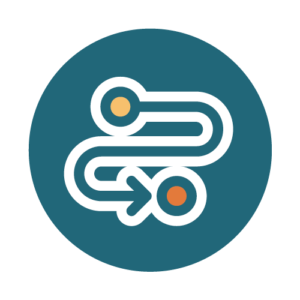 When we don’t prioritize planning and don’t design with intention, and when we work more like handymen than like architects, we aren’t working efficiently.
When we don’t prioritize planning and don’t design with intention, and when we work more like handymen than like architects, we aren’t working efficiently.
Thoughtful planning and intentional design enable efficiency.
Pro-active process management and improvement also increase efficiency. The ways we work are often a patchwork of tasks, requirements, and habits that come together over time as a result of changing technology, stakeholder requirements, personal preferences, and fads. As a result, team members are stepping on each other’s toes, touching the same thing too many times, doing things different ways, and getting frustrated with colleagues whose processes they don’t understand.
We help organizations identify and diagnose ways they are working that have become stale, broken, or inadequate. Then, we help you make targeted and meaningful improvements. Using tools from process management and continuous quality improvement, we help organizations (re)design processes and tools that are multi-purpose, cohesive, and integrated, so you can channel more of your energy into value-adding, mission-driving work.
As a sector that’s starved for resources yet charged with addressing some of society’s most intractable problems, we can’t afford to waste any time, energy, knowledge, or money. Time is money, and money is mission. Investing in efficiency is an investment in mission impact.
Learn Continuously
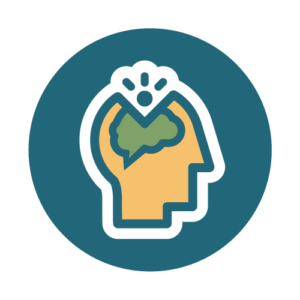 Today’s nonprofit leaders know that evaluation is essential to success. Feeling pressure from boards and funders, hungry for data to inform decisions, and eager to tell compelling stories that engage supporters, nonprofits are stepping up their evaluation efforts. We help organizations identify the meaningful, measurable, and manageable data they need to inform their work, and then we help them develop the tools and processes to gather and manage it. This is where our work began, and it’s still the core of what we do.
Today’s nonprofit leaders know that evaluation is essential to success. Feeling pressure from boards and funders, hungry for data to inform decisions, and eager to tell compelling stories that engage supporters, nonprofits are stepping up their evaluation efforts. We help organizations identify the meaningful, measurable, and manageable data they need to inform their work, and then we help them develop the tools and processes to gather and manage it. This is where our work began, and it’s still the core of what we do.
But to become an organization that learns requires more than the acquisition of training, information, or data. Learning organizations make meaning out of observations, experiences, and information and then translate it into decisions, plans, and changes. This requires a culture of curiosity, experimentation, and humility and systems for quality improvement. Organizations that learn create systems of incentives, rewards, and rituals that support reflecting, questioning, experimenting, and adjusting – with purpose and intention. Becoming a learning organization is a process that requires attention and effort, and we aim to equip and empower nonprofits for the journey. We help by reimagining how you share and use data, developing practices and habits for reflection and learning, planning for knowledge management, and building skills and systems for cycles of continuous improvement (not just compliance).
The Bottom Line
We are confident most nonprofit leaders agree that these capacities are valuable or even essential to organizational success. But too often, nonprofit leaders struggle to dedicate sufficient time, attention, and energy to these practices. Instead, they are living under the tyranny of the urgent, constantly putting out fires, and operating in survival mode. We understand the realities nonprofits face. We get the pressures you’re under and how many needs you’re balancing.
Our argument is that an up-front investment in these capacities will prevent fires, avoid problems, and save more time, energy, and money than they require. And, we believe these capacities will even increase sustainability and impact long-term. Creating the tools isn’t enough. A focus on creating tools by themselves is another symptom of our bias toward activity and busy-ness, our predilection for productivity, and our compliance culture. Check the box. Move on.
Instead, we aim to create opportunities, share insights and perspectives, provide tools, and teach skills that empower and equip you to align all your efforts with your greatest intentions, so you can maximize your impact. This requires stepping outside of the moment, connecting with your intentions, seeing the bigger picture, and reclaiming your time, attention, and energy. That’s when your tools will come to life and deliver a return on your investment!
